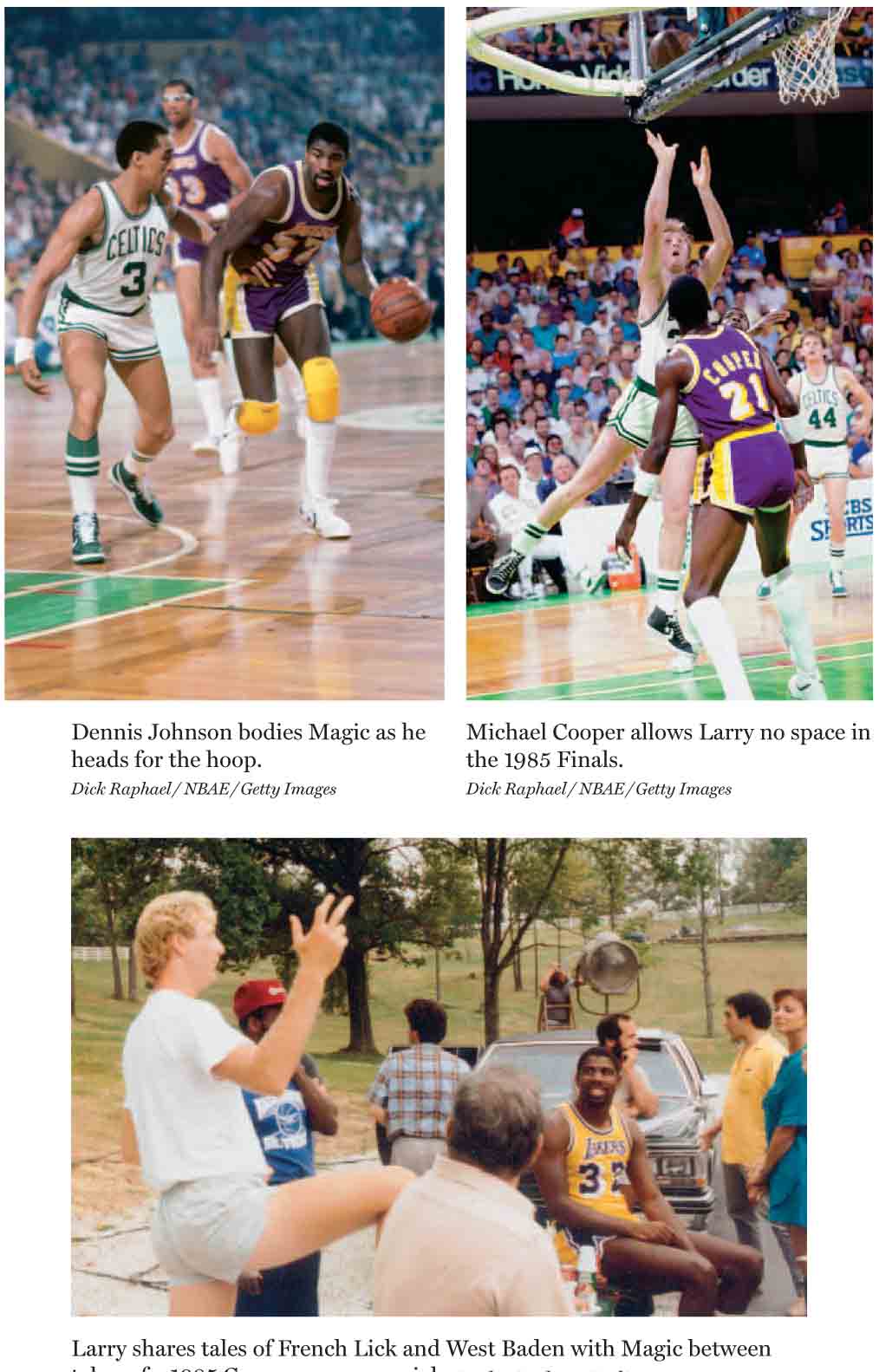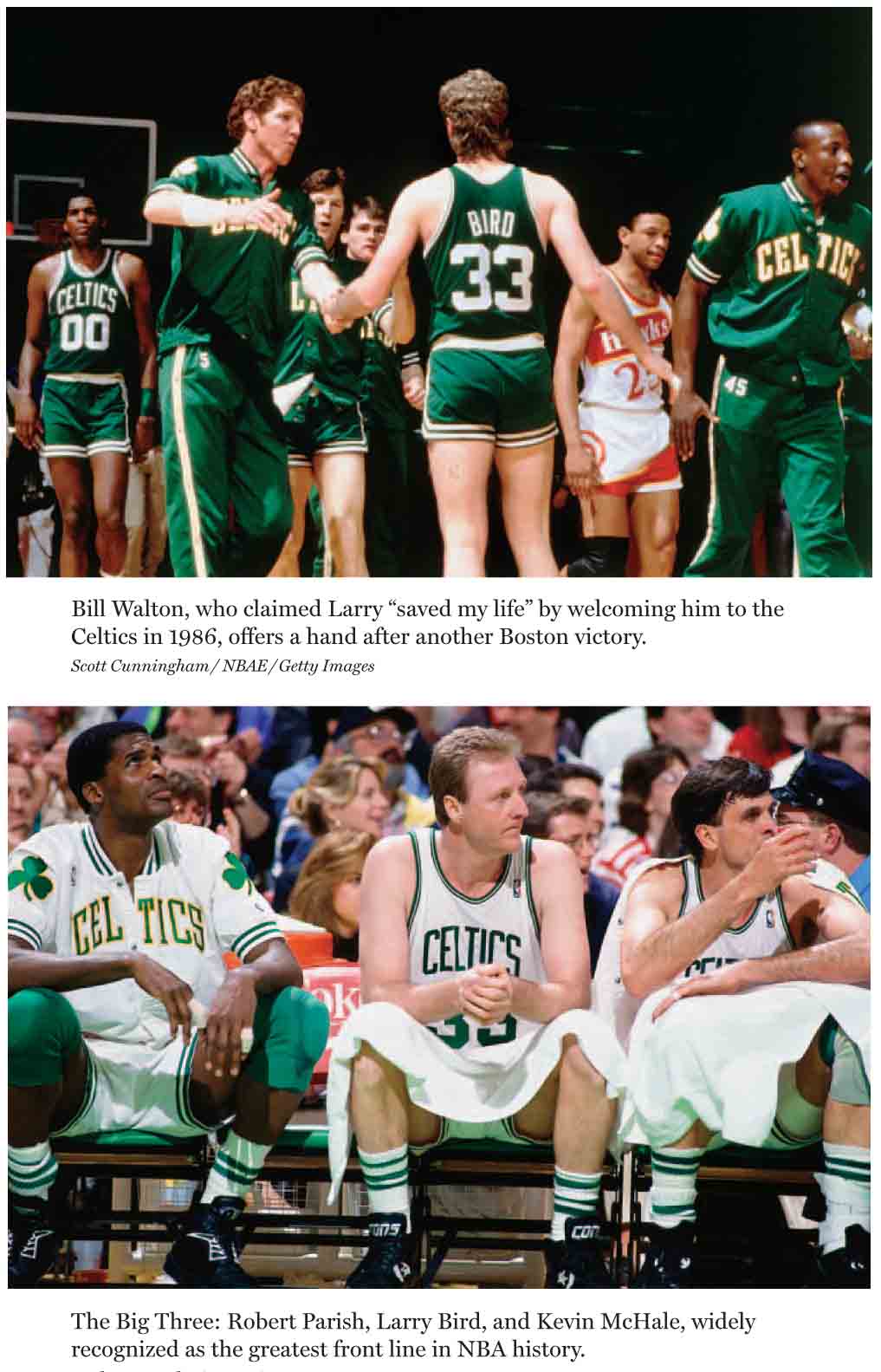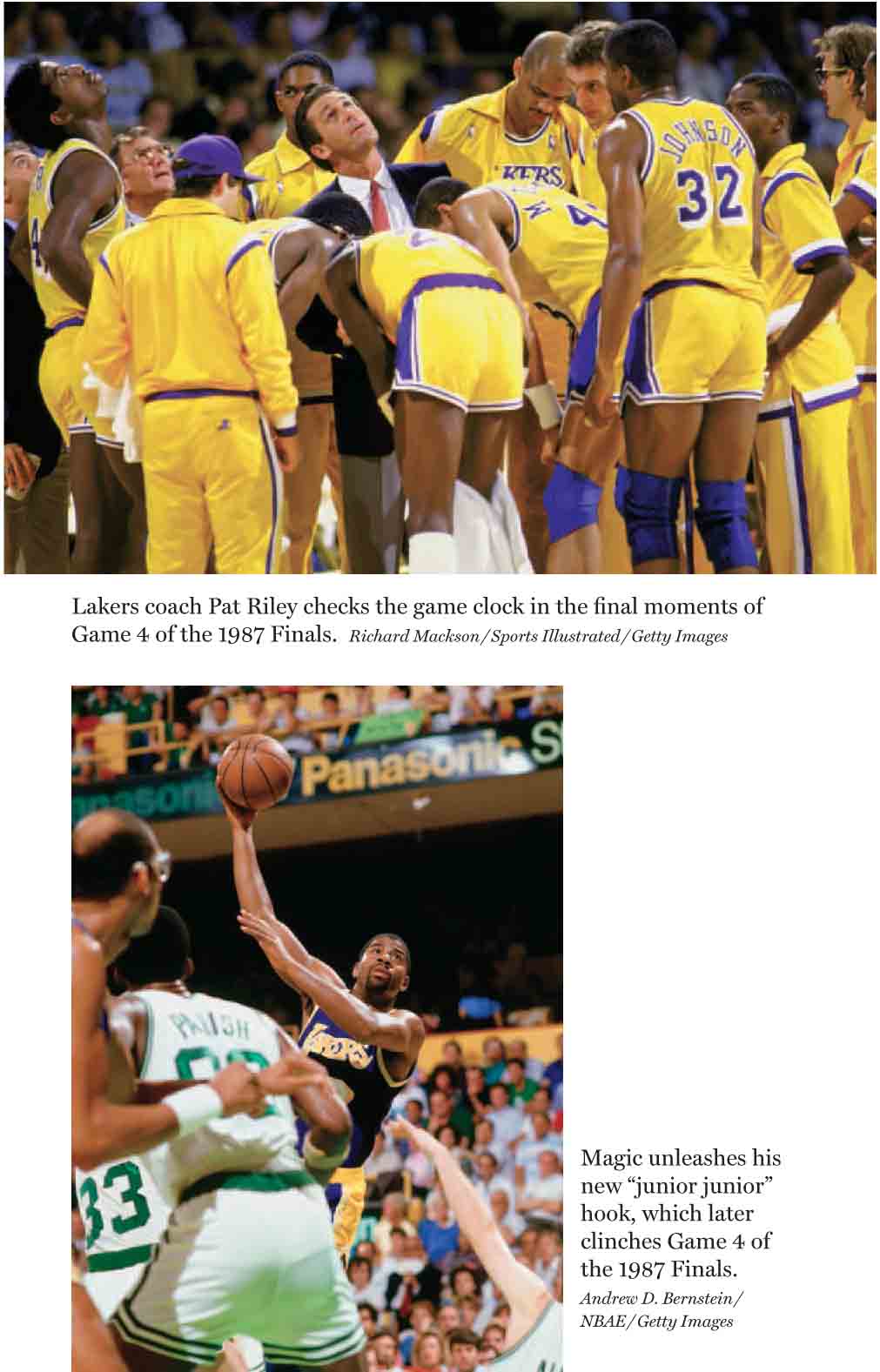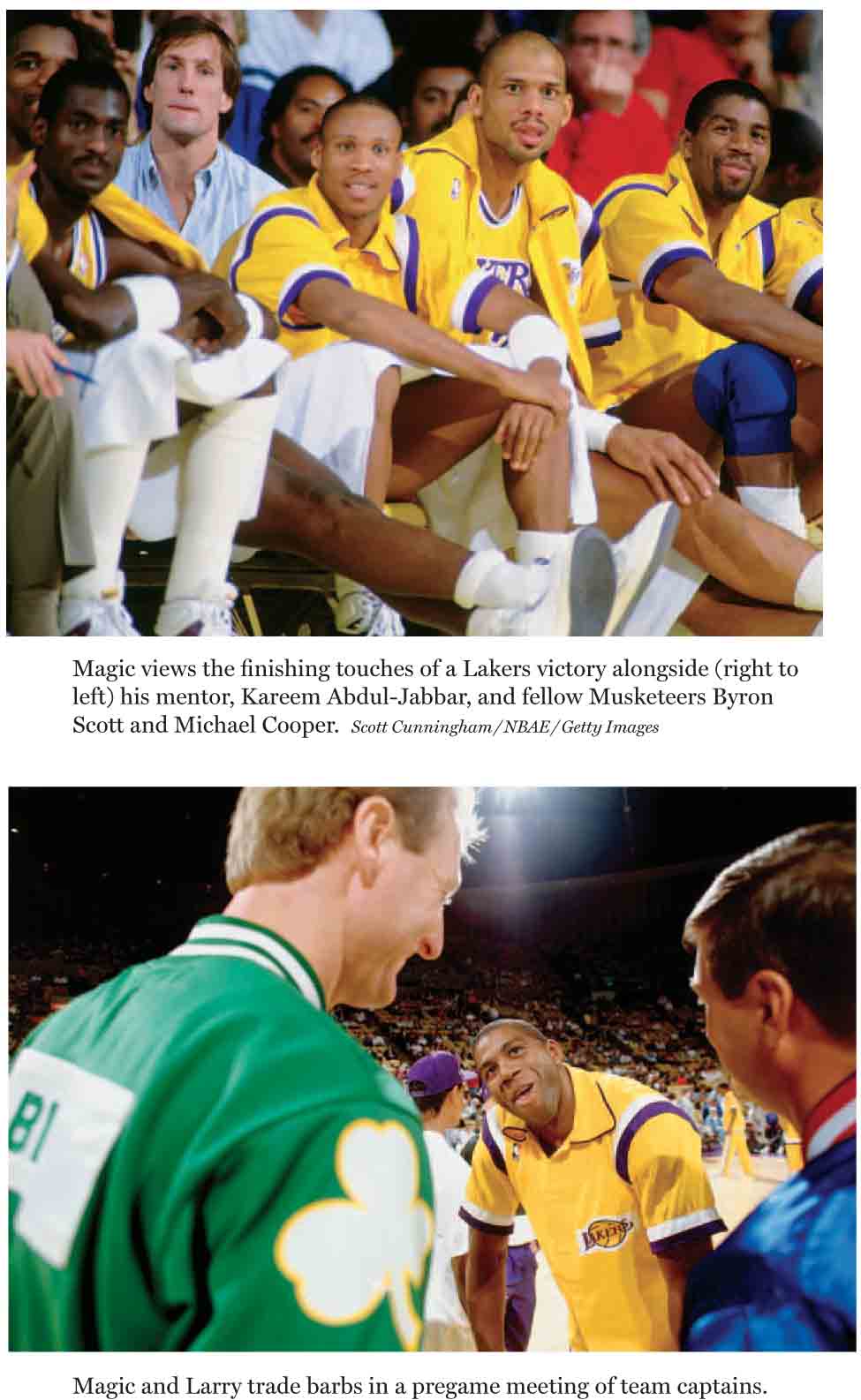When the Game Was Ours (29 page)
Read When the Game Was Ours Online
Authors: Larry Bird

Jackie and Jermaine Jackson from the Jackson Five became regulars at the Lakers games and invited Magic to Hayvenhurst, their gated mansion, where they tried to coerce him into dating their sister La Toya.
One night Johnson was hanging with Jackie when the singer said, "You should come on tour with us."
"What would I do?" Magic asked.
"Hang with the brothers!" Jackie answered.
Johnson joined the Jackson entourage for the "Triumph Tour" in 1980 and the "Victory Tour" in 1984. He ate with them, traveled on their tour bus, even sat onstage while they performed. He was overwhelmed by the number of fans, lined three deep, who clamored for a view of the musical idols.
The Jacksons had it all worked out. They sent out a pair of stretch white limousines with dark-tinted windows an hour or so before the show, and the fans went berserk in pursuit. Hundreds of girls sprinted after the vehicles, shrieking their undying devotion.
Ten minutes later, after most of the crowd had dispersed, a nondescript white van pulled out of the hotel with the legendary band of brothers and a future Hall of Fame basketball star inside.
Had Riley been aware that Magic was touring with Motown stars, he most certainly would have objected. Jerry Buss, meanwhile, thought Johnson's travels with the Jackson Five was a terrific opportunity.
"Nobody balanced loving the game and loving life better than Earvin," said Jerry Buss.
It was a juggling act his coach could not understand. Riley was not capable of doing anything in season except immersing himself in the Lakers. He often lectured Magic that there were two states of mind in competition: winning and misery.
Misery, it seemed, was always lurking. Even though the Lakers broke out of the 1985â86 season with a 27â3 mark, there were subtle warning signs that their team structure needed tweaking. Abdul-Jabbar was still the focal point of the Lakers, yet Magic could see evidence of fatigue, particularly after long road trips or back-to-back games. Kareemâfinallyâwas showing his age.
The addition of Walton enabled the Celtics to tag-team Abdul-Jabbar with both Parish and the big redhead. It also afforded them the opportunity to play both big men side by side, a lineup that coach K. C. Jones implemented on occasion.
Boston breezed to the Finals, but not before the emerging Jordan provided them with a glimpse of the NBA's future in the first round. "His Airness" was spectacular in defeat, dropping 63 points on the Celtics in Game 2 of a three-game sweep. His otherworldly performance prompted Bird to remark, "That was God disguised as Michael Jordan."
Knowing he had witnessed the next marquee star, Bird felt even more urgency to seize another title while the Celtics were young and healthy. Jordan didn't yet have the complementary pieces he needed to contend for a championship, but it was clear to Bird that it was only a matter of time before he would.
"Early on, people were saying Michael didn't have a team mentality," Bird said. "That was because he didn't have a
team.
"
Magic and Bird weren't the only ones checking each other's box scores in the eighties. Young Jordan took note every time Johnson recorded another triple-double or Bird submitted another 16-rebound effort. The two superstars became his standard of measurement.
"They had what I wantedâthe respect of the entire league," Jordan explained.
The anticipated LA-Boston Final in the spring of 1986 did not materialize. LA was derailed by a Houston Rockets team that featured twin towers Akeem (later Hakeem) Olajuwon and Ralph Sampson, the object of Auerbach's desire five years earlier. It was Sampson who drove the final stake through LA when he nailed a 12-foot, blind, turnaround corkscrew jumper at the buzzer to eliminate Los Angeles in six games in the Western Conference Finals.
Again, Bird felt cheated. His 1986 team was one for the ages, and he was certain they could have beaten LA.
"I would have rather played the Lakers," Bird said. "I would have rather played the best."
The Rockets proved to be a suitable consolation prize. The series held extra meaning for Bird because he would be playing against his former coach and mentor, Bill Fitch, whom he still revered. It was paramount for him to perform admirably in front of his first NBA coach.
Very quickly, Ralph Sampson became the lightning rod of the series. The 7-foot-4 forward shot 1 of 13 from the floor in Game 1 and appeared to be genuinely spooked by Boston's formidable front line. No wonder. Bird, Parish, and McHale combined for 65 points in the Celtics win.
Coming into the Finals, national pundits were trumpeting Houston forward Rodney McCray as a potential Bird stopper, similar to how Robert Reid was portrayed three years earlier. Bird, who never felt anyone except Cooper had successfully stymied him, took offense and torched McCray by scorching him for 31 points on 12197
of-19 shooting in Game 2. It wasn't until Game 3 that Sampson discovered his comfort zone and submitted a monstrous game, with 24 points and 22 rebounds in a Rockets win.
Game 4 provided the backdrop for Walton's signature moment. With the score tied 101â101 late in the game, Walton wrestled away an offensive rebound and relayed it to Bird, who calmly swished a three-pointer. On the next possession, Walton converted a tip-in to put his team in front for good. He finished 5 of 5 from the floor.
In Game 5, with the Rockets trailing 3â1 in the series, Sampson demonstrated the collective frustration of his team when he tried to establish position in the post on a mismatch. Jerry Sichting, Boston's balding Charlie Brown look-alike who was 11 inches shorter than Houston's big man, grabbed on to Sampson on the block and wrestled with him until help arrived.
Sampson didn't appreciate the guard's hands-on tactics and reared back and punched Sichting. Dennis Johnson charged in to defend his teammate, and Walton administered an impressive open-field tackle to send Sampson sprawling to the ground. Predictably, both benches emptied.
Sampson was ejected and later fined $5,000. Houston rallied to win 111â96, but their big man was heading back to Boston as Public Enemy Number One.
Celtics fans were among the most knowledgeable in the NBA. They knew the names of the opposing coaches and trainers and were on a first-name basis with nearly every referee. They knew the strengths (and weaknesses) of the opponent and exploited them accordingly. Sampson became the sole target of their ire, and the slender giant was barraged with insults and crude references to his family.
"It was brutal," Bird said. "Some of the worst I've ever heard."
The catcalls were incessant. Sampson was a crybaby, a bully, a coward. A petite woman sat on the floor with a sign that announced Sampson is a sissy! on the front, and H
EY
, R
ALPH
, I'
M
5-
FOOT
-l, 90
POUNDS
. D
O YOU WANT TO FIGHT ME TOO
?! on the back.
Sampson checked out at the half, having shot a dismal 1 for 8 from the floor. Houston was reeling from a 55â38 deficit, and Bird already had rung up 16 points, 8 rebounds, and 8 assists.
"I was so pumped up, I thought my heart was going to jump right out of my chest," Bird said.
At halftime, sensing victory was looming, Bird departed from his usual custom and changed his jersey. He wanted to have two souvenirs to commemorate what he knew was a historic team. After he capped off his evening with 29 points, 12 assists, 11 rebounds, and the Finals MVP trophy, Bird gave both jerseys to the team equipment manager and told him to tuck them away safely somewhere. The next day, when Larry went to retrieve his mementos, both jerseys were gone.
The Celtics convened to celebrate their championship at the downtown restaurant owned by K. C. Jones. Bird, while elated, was also exhausted. The days of bumming rides from fans on Storrow Drive and partying until the wee hours of the morning were behind him. He was home and in bed by 10:30
P.M.
His phone rang throughout the evening, but he ignored it. All he wanted to do was sleep.
"Bill Walton is on the phone," Dinah said.
"No," Bird answered. "I'm done."
Just after midnight, the doorbell rang at Bird's Brookline home. Walton stood sheepishly on his doorstep.
"I know you're tired," said his friend, "and I know you're in bed. But I'm going to sit out here and listen to the Grateful Dead, and I'll be here when you wake up."
Bird shrugged, patted his friend on the shoulder, then headed back to his bedroom. Walton sat in his friend's kitchen all night, nursing a glass of Wild Turkey and reveling in the moment.
"I sat there and enjoyed how wonderful it was to be on a team with Larry Bird," Walton said. "I was an old broken-down player who could appreciate what had just happened. Larry, Kevin, and Robert were still young enough to think it would last forever.
"I knew that wasn't so."
When Bird awoke the next morning and got up to take a shower, he wasn't sure if he dreamed Bill Walton's visit. He poked his head into his kitchen and saw the big redhead sitting there, just as he had left him.
"Hey," Bird said. "Did you fall asleep?"
"Larry," Walton answered, "we are world champions. How do you expect me to sleep?"
Just as they had done the previous fall, Bird and Magic filmed another Converse ad in September, this time in conjunction with Isiah Thomas, McHale, Mark Aguirre, and Bernard King. The commercial, in which each player rapped a few lines that were both horribly corny and terrifically funny, opened with Magic holding his yellow-and-purple Converse shoe and rapping, "The Converse weapon, that's the shoe. Lets Magic do what he was born to do." From there Isiah, then McHale, then Aguirre, then Bernard King described what the shoe did for them. King's rap of "What can the Weapon do for the King? Why, I can do just about anything," was followed by a bubbly Bird who declared, "You already know what they did for me."
The collection of NBA players asked in unison, "What?"
"I walked away with the MVP!" said Bird, cradling his trophy and beaming like a Hollywood star.
No wonder Bird was so happy. At the time, he was a reigning NBA champion who was recognized as the best player in the league and had the hardware to prove it.
Within a year, the smile, the trophy, and the championship would be gone. His endorsement partner Magic Johnson would pilfer all three of them.




